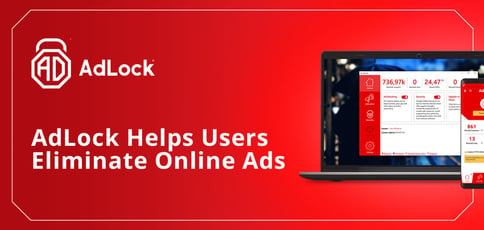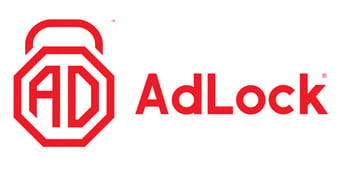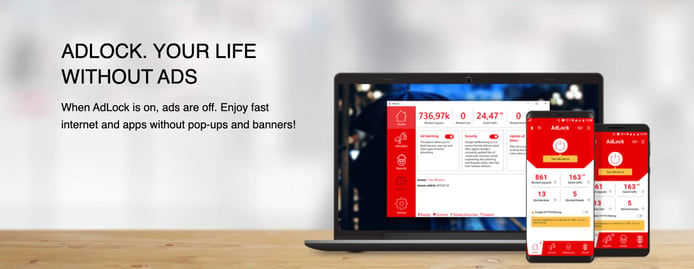
TL; DR: AdLock’s advanced software allows users to customize and clean up their internet experiences. The solution filters unwanted or unnecessary ads while decluttering browsers and eliminating visual noise. And AdLock continues to innovate products to stay ahead of targeted media companies and help users avoid excessive and manipulative advertising.
Alvin Toffler, a futurist and writer, saw the impact that advertising had on his generation in 1970. And his predictions about how advertising would grow are unsettlingly accurate today, especially as they apply to the online experience:
“Information overload occurs when the amount of input to a system exceeds its processing capacity. Decision-makers have fairly limited cognitive processing capacity. Consequently, when information overload occurs, it is likely that a reduction in decision quality will occur,” he wrote in his book “Future Shock.”
Having more information at our disposal than ever before doesn’t always produce ideal results, according to Toffler. Instead of progressing, many online workers become numb to information because there is too much to sift through.

AdLock helps users cut out the advertising clutter and clean up their digital experiences.
Media corporations have been accelerating that information overload by filling up a significant portion of the digital landscape with advertisements. Few spaces on a consumer’s phone or computer are free from ads, including banners and pop-ups. Not only do those ads take up valuable space, but they are also becoming more personalized and difficult to control.
AdLock returns power over ads to individuals. It allows average internet users to completely customize their online ad experience, allowing what they want in and keeping the rest out.
“Internet advertising has totally reimagined the market. The related technologies have given marketers and advertisers superb tools for analysis, penetration, and delivery,” said Dmytro Astrakhantsev, CEO and CTO of AdLock. “Predictably, they have filled all available information platforms with diverse advertisements.”
That’s why AdLock allows everyday users to connect to servers with confidence and return them to a clear screen and a clear mind.
“We wanted more in-depth settings and a better understanding of how we can filter user content. The reward for this is a clean and tidy infosphere,” Dmytro said. “We do not dispute that advertising is the engine of progress, but we insist that everyone should have the right to choose.”
Helping Users See Past the Flood of Online Advertisements
Big business hadn’t figured out how to monetize the internet in the early days. Information was typically free and was shared with little expected in return. Today, advertising has become a dominant profit-generation model. In 2019, Google made more than 70% of its annual revenue — over $160 billion — through advertising.
That’s why consumers often feel like they’re on someone else’s property when they connect to a server. AdLock turns the tables to provide them with control over that landscape and what they see.

AdLock technology works on a variety of devices, including desktops, laptops, and mobile devices.
Another concern about current advertisements isn’t just how much space they take up, but how much private information they use in the process. Most media conglomerates collect information from keyword searches and website visits to personalize ads. That is why someone will see advertisements on their devices for Caribbean vacations if they just searched for a cruise to the Bahamas.
AdLock includes features that help hide that data and eliminate bugs and spyware. But average users still need to inform themselves and be proactive. AdLock helps them keep their computers from becoming billboards and their data from being used to target ads.
“It’s built to satisfy web users,” Dmytro said. “The web becomes so clean, and the difference is felt so dramatically that you start to fidget in your seat because you’re not used to working without seeing advertisements.”
Enhancing Business Efficiency by Cutting Down on Distractions
Users not only gain more control over their computer screen, but their overall productivity as well. That can be especially critical in today’s remote workspace as employees have traded being distracted in the office to being distracted at home.
Though remote work has been more efficient for many companies, the new distraction is no longer chatty coworkers but noisy advertisements. That means that workers who control their technology and settings can enhance their output.
Distractions like constant advertisements can make focusing harder, and employees who are exiting out of pop-ups hundreds of times a day inevitably lose some productivity. More than 70% of workers said they feel distracted on the job according to a 2018 Udemy survey. And anything a business can do to eliminate those distractions is a win for productivity — and the bottom line.

Employers can eliminate distractions for workers with AdLock’s comprehensive product.
The most successful workers and businesses are hyper-aware of their time and the noise they allow into their headspace. If they give their time to everyone, or just listen to the loudest voices, they may never get into a flow or solve any problems.
AdLock is one of the tools that can help them create space and self-discipline by blocking pop-ups, banners, and videos from ad servers. Udemy also found that it can often take workers 30 minutes to get back into their flow after a significant distraction.
Just a couple of ads in the wrong place at the wrong time could cost someone an hour of work in a day. That’s why many businesses choose AdLock to boost employee productivity.
AdLock: Staying Ahead of the Ad Industry and Expanding Services
Media giants have research and development departments coming up with new and more powerful ways to get their advertisements in front of people. Many ad blockers don’t keep up, allowing the advertisers to keep the upper hand. AdLock continually updates its tools and strategies to stay ahead of those new techniques, and it is currently focused on fighting advertisements with enhanced ad-blocking software.
“The rules of development in our business are often dictated by media giants, which introduce more and more formats for delivering content to users,” Dmytro said. “Technologies become more complex and sophisticated, making it more difficult for ordinary users to get to the crux of the problem. Complexity in creating an effective method dissuades and repels some developers, but not us. For us, it’s an exciting process with generous rewards — in the form of a clean web, of course.”
AdLock anticipates a future internet landscape in which ads are no longer spam. And Dmytro said he believes that AdLock can help foster that symbiotic server relationship between businesses, advertisers, and internet users.
“Users are tired of seeing tons of ads that no one pays attention to. That also means advertisers are wasting their money, and we have seen a lot of research confirming that,” Dmytro said. “But when there is a need to find something quickly, it becomes a real problem. Perhaps the targeted market segment requires some new ad format. Only time and technology will arrange everything back to order.”
HostingAdvice.com is a free online resource that offers valuable content and comparison services to users. To keep this resource 100% free, we receive compensation from many of the offers listed on the site. Along with key review factors, this compensation may impact how and where products appear across the site (including, for example, the order in which they appear). HostingAdvice.com does not include the entire universe of available offers. Editorial opinions expressed on the site are strictly our own and are not provided, endorsed, or approved by advertisers.
Our site is committed to publishing independent, accurate content guided by strict editorial guidelines. Before articles and reviews are published on our site, they undergo a thorough review process performed by a team of independent editors and subject-matter experts to ensure the content’s accuracy, timeliness, and impartiality. Our editorial team is separate and independent of our site’s advertisers, and the opinions they express on our site are their own. To read more about our team members and their editorial backgrounds, please visit our site’s About page.



